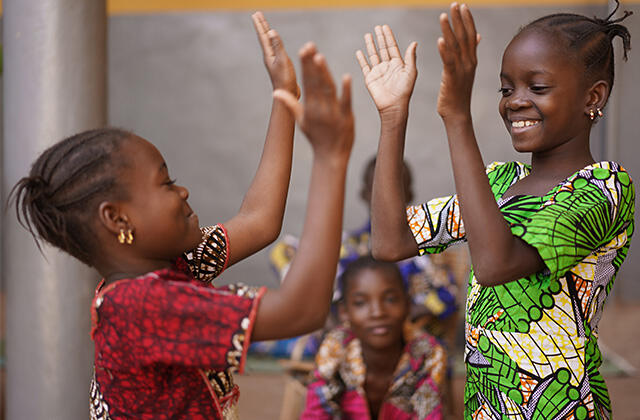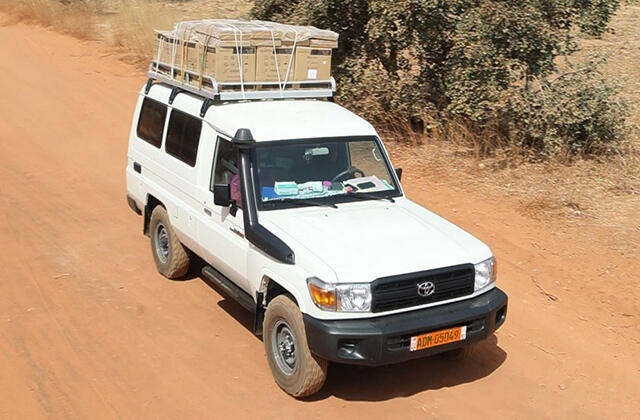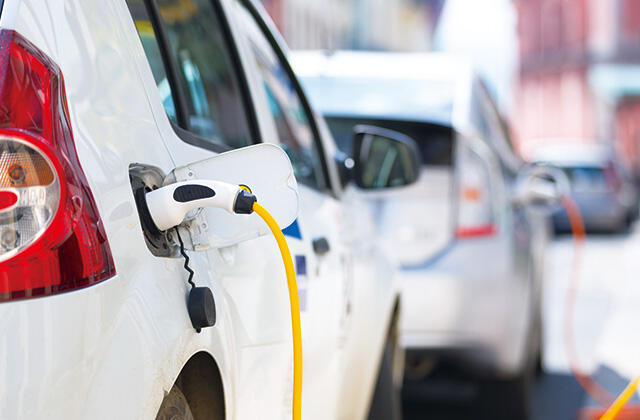Constructing an Aerial Logistics Network with Drones
Making lifestyles more prosperous and convenient with next-generation technology
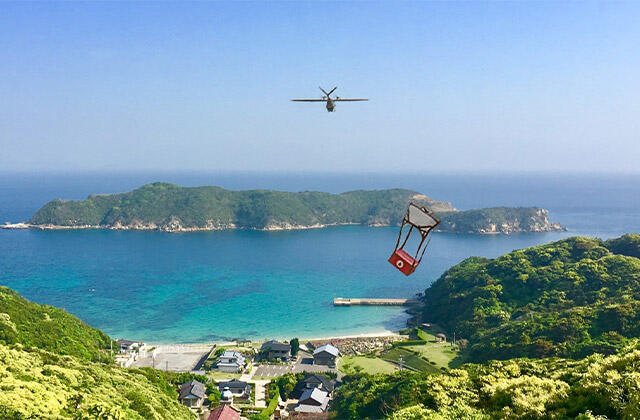
March, 2023
An Aerial Industrial Revolution Created by Drone Technology
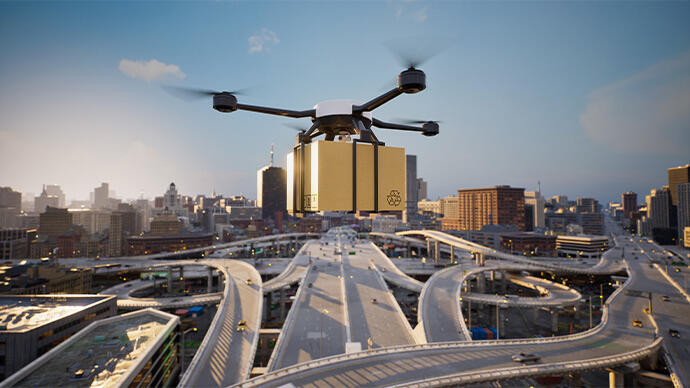
More and more attention is being paid to drones as a new form of logistics.
Drones are being increasingly used for things like movie-making or filming events, surveying areas where humans cannot easily get to, or spraying agricultural chemicals over fields where there are few restrictions on flying. They provide convenience and safety in a wide range of fields and industries. With technological innovation comes the preparation of laws and the relaxation of restrictions, so many people are looking forward to drones bringing an Industrial Revolution in the sky.
Looking at the market scale, the world drone market is expected to grow from 20 billion dollars in 2021 to about twice that, 40 billion dollars, by 2027.*1 Even within Japan, the market, which was 230 billion yen in 2021, is forecast to grow to a bit under 800 billion yen by 2027 (Total of drones, services, and related services. The services field (figure below) is expected to grow to 514.7 billion yen). Logistics, part of the services field, is expected to show rapid growth.*2
The strengths of drone delivery are being able to reduce traffic jams by making it separate from land-based logistics, and being able to carry items faster than on land. In addition, compared to logistics using trucks, for example, CO2 emissions can be reduced, contributing to achieving carbon neutrality. Moreover, drones fly autonomously, so they can solve the shortage of drivers and are also expected to play some role in achieving labor savings.
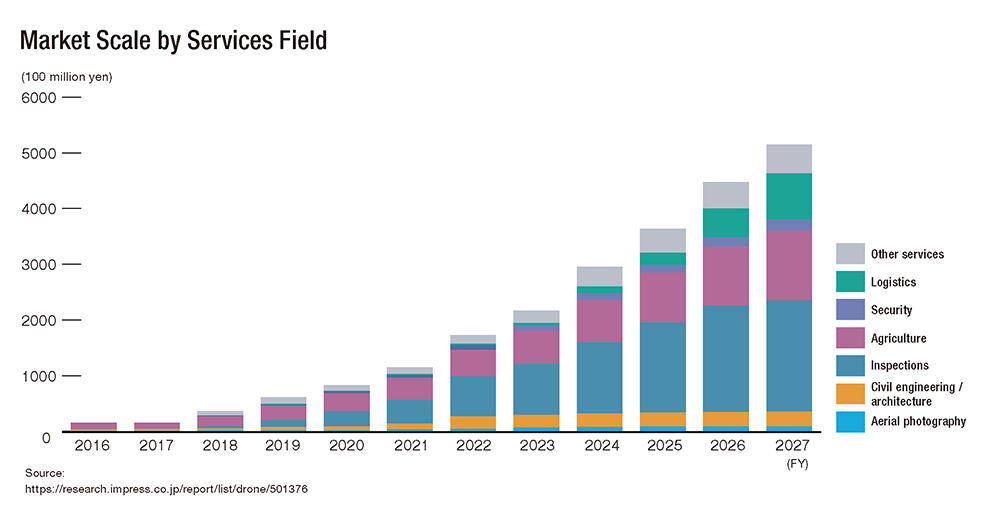
Support for Mobility-related Start-ups
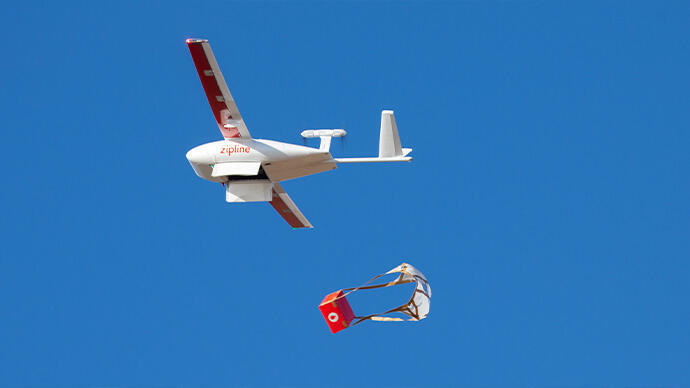
The Toyota Tsusho Group is preparing for changes in society as drone use increases and in light of these strengths. Along with presenting "contribute to the creation of a safe and comfortable mobility society" as one of the six Key Sustainability Issues (Materiality), the Group has set its Next Mobility Strategy, which aims to expand business fields for "next mobility," including drones, as a priority area in its Mid-term Business Plan announced in 2017. In addition, an in-house fund (the Next Technology Fund) that carries out dynamic investment in innovative technologies, patents, and new services, was established, and in 2018 it invested in Zipline International Inc., a U.S.-based start-up for instant drone delivery service forming a capital and business tie-up.
Zipline International is a company that has succeeded in commercializing instant drone delivery service. It started a logistics service using drones to deliver blood products for transfusion to hospitals in Rwanda in 2016. It is currently working on delivering pharmaceuticals such as vaccines, and in 2019 it started a drone delivery service business in Ghana as well.
The Era of Level 4 Operation Is Nearly Here
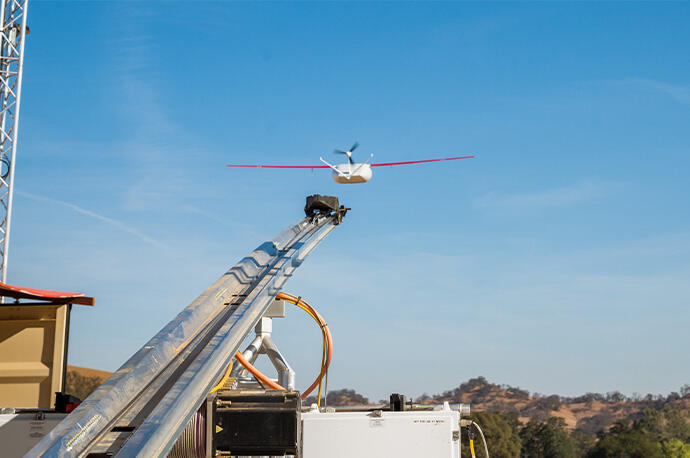
Building on its experiences in Africa, in 2021 Toyota Tsusho signed an agreement with Zipline International for a strategic operational partnership. The lack of manpower in the logistics industry is becoming very serious in Japan, and delivery to remote islands and mountainous areas is an issue. One of the main goals of this strategic operational partnership is solving this issue through the social implementation of drone delivery services.
Looking at the roadmap towards the social implementation of drones in Japan (prepared by the Public-Private Sector Conference on Improving the Environment for UAVs), Level 4 operation will be implemented during FY2022 for remote islands and mountainous areas. After that, it will move towards the simultaneous operation of multiple drones and in areas with high population density.
Level 4 refers to the level for flight permission, approval, and registration system for drones and other unmanned aerial vehicles (UAVs) under the Civil Aeronautics Act (Levels 1-4. See diagram below).
Drones have the risk of falling, and if they fall in a populated area they could cause harm to people or objects, so at present Level 4 operation is not permitted. However, as technological innovation is getting near the level where this risk can be kept down, the roadmap shows that Level 4 operation may be possible in FY2022. Certification for drone's hardware safety and pilot licenses obtained proving operator skills will be required to enable Level 4 operation.
- *Based on the information as of November 30, 2022. Level 4 operation has since become possible with the new system that started on December 5, 2022.
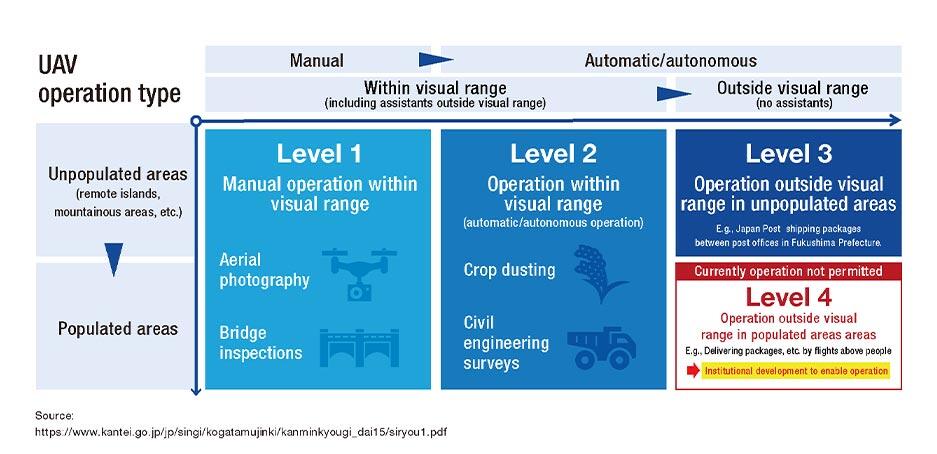
A New Business Based on Genchi, Genbutsu, Genjitsu (On-site, Hands-on, In Touch)
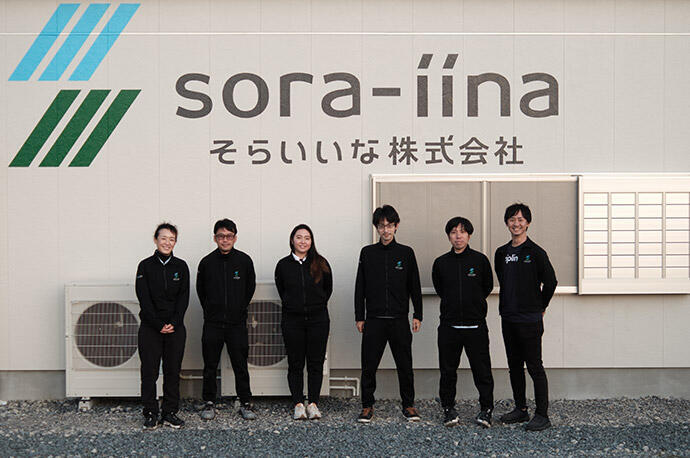
To start a drone delivery business in Japan, Toyota Tsusho established Sora-iina as a Group company for drone delivery in 2021. This company has entered into long-term demonstration contracts with pharmaceutical wholesale companies on the Goto Islands of Nagasaki Prefecture, and provide a B2B business that transports pharmaceuticals for medical use by drone to medical institutions or pharmacies.
The Goto Islands are a local authority with a population just under 60,000 made of 152 large and small islands where Goto City and Shinkamigoto Town are located. Toyota Tsusho has a familiarity with the local area through its Group company, Tuna Dream Goto Co., Ltd., which is engaged in full-cycle aquaculture of bluefin tuna, helping it be aware of local issues related to logistics. So the Goto Islands were chosen as the site for the Group's first Japan-based drone business for this reason. The business aims to eliminate gaps in access to medical services and distribution issues.
Goto city has been carrying out PoC (proof of concept) projects for drone delivery and in FY2018 it launched a five-year project, the Goto City Drone i-Land Project. This helped spur commercialization. The business concept unique to Toyota Tsusho, which tackles problem-solving using Genchi, Genbutsu, Genjitsu (on-site, hands-on, in touch), and the "Smart Island" concept unique to the Goto Islands, which are engaged in making the area more convenient and improving its value, overlap. Thanks to this, a partnership among the local government, the medical association and pharmaceutical association, medical service workers, Nagasaki University, and others was formed.
Building Up a Track Record Aiming to Expand the Service
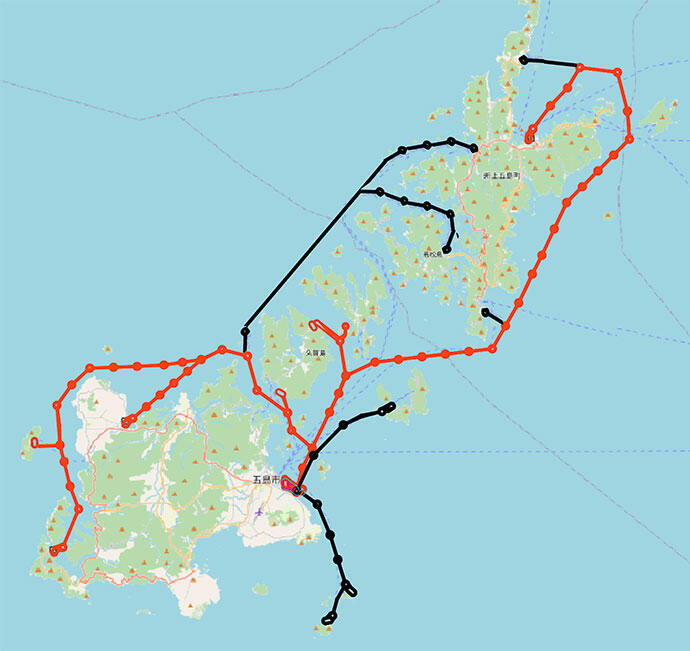
The drone launch and recovery base is on Fukue Island, Goto City. The base has a catapult*, drones, system to recover the drones collection facilities, and so on provided by Zipline International, and is used to deliver pharmaceuticals and daily goods to areas like Naru Island and Shinkamigoto Town. This is the first case of Zipline International providing technology to another company.
The delivery method is as follows: first, the pharmaceuticals or other items are placed in a box with a parachute, and loaded into the drone. The destination and route are written to the SD card installed within the battery. Then the launch button is pressed and the drone is thrown up by the catapult. It drops the package at the designated location, then returns to its base.
The Goto Islands have a low population density, and are hilly regions surrounded by the sea, so this makes them suitable for Level 3 operation. Once accumulating experiences of Level 3 operation, Sora-iina aims to lead the industry as a leading company in drone delivery services once Level 4 operation is permitted. In terms of services, in addition to expanding the number of medical institutions and pharmacies to which pharmaceuticals are delivered, Sora-iina will also expand into the delivery of daily goods and groceries as ordered by individual residents.
- *A device that uses explosives, steam power, springs, etc. to launch aerial vehicles from small areas
Issues with and the Future of Drone Delivery
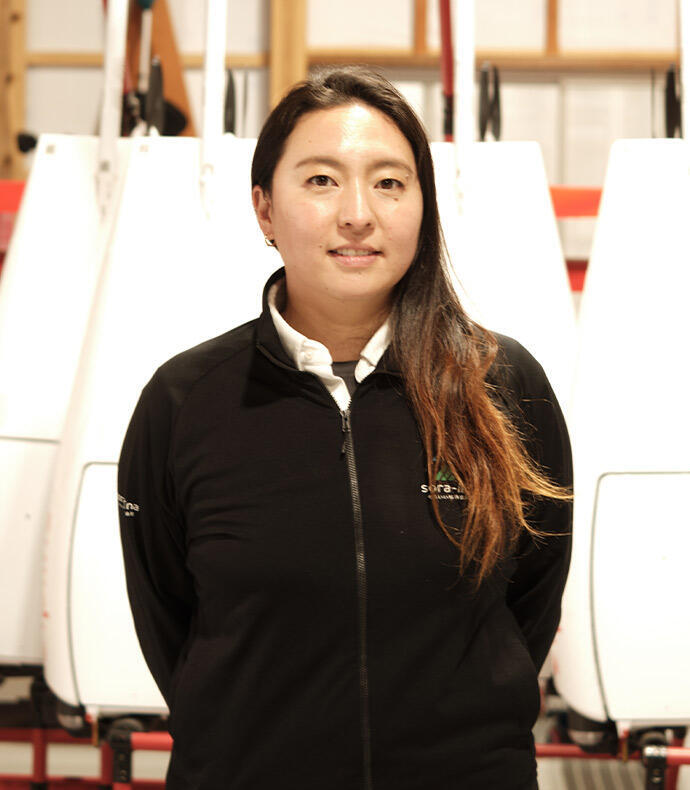

How did the name "Sora-iina" come about?
By building a distribution network in the sky, we are now able to provide necessities when needed to locals, who faced issues with delivery. The name, which means "the sky, so nice," came about because we wanted people to think that the sky, delivering convenience, was so nice. In addition, there is a diverse range of items that can be carried by drone delivery service. The name also conveys expectations of the future, in the sense of having customers and residents say "that's nice" (which sort of sounds like "sky, so nice" in the local dialect) as we continuously work on ideas and ways to make services more convenient and implement them locally.
What issues do you have in expanding the business?
One is the relaxation of Level 4 restrictions following modification to the Civil Aeronautics Act. To prepare for this, we are accumulating experiences and knowledge of Level 3 operation by flying in unpopulated areas such as over the sea. In addition, we are considering the possibilities of working with businesses in a range of industries that are interested in Zipline and expanding to deliver products other than pharmaceuticals.
Another is regulations related to what pharmaceuticals we can deliver. At present, the guidelines for drone delivery of pharmaceuticals as set by the Cabinet Secretariat, the Ministry of Health, Labour and Welfare, and the Ministry of Land, Infrastructure, Transport and Tourism mean that we cannot use drones to deliver highly toxic or deleterious pharmaceuticals as stipulated by the Minister of Health, Labour and Welfare. On the other hand, as these pharmaceuticals are in high demand in local medical treatment, we are holding discussions towards the revision of these guidelines by sharing feedbacks from the field and data of our actual delivery track to date.
What makes the business feel worth it to you?
As the company representative, I feel rewarding by being able to challenge in this new drone delivery industry as a leading company. and strongly aim to achieve success as a pioneer.
Personally, I felt that Toyota Tsusho's slogan when I was looking for work, "A general trading person wearing work clothes" was cool. I also still feel the most empathy with the action principle of Genchi, Genbutsu, Genjitsu (on-site, hands-on, in touch). Sora-iina's business, rooted in the Goto Islands, is a business worthy of Toyota Tsusho. I feel rewarding in achieving operational excellence* through collaboration with public authorities, the local government, the medical association and pharmaceutical association, customers, and others.
- *This refers to creating corporate value and building competitive advantages by increasing the effectiveness and efficiency of business activities and refining work operations.
What do you to aim to achieve through this business?
By promoting innovation for next-generation logistics, I feel we can achieve strengthening of the foundations of medical services and lifestyles as well as regional revitalization through the creation of jobs. Looking at the Goto Islands as an example, there is no university on the islands, nor any branches of major IT companies. It will be an honor if we could play a part in getting children to want to keep living on these islands.
In addition, Goto City has declared itself to be a Zero Carbon City, and about 80% of the energy used here is renewable energy. As one of the main points about drone delivery is that it consumes less energy than land-based shipping, making it a bigger contributor to carbon neutrality, we want to contribute to the area from the aspect of promoting GX (green transformation) through DX.
Continuing to Lead the Field of Next Mobility
There are more and more initiatives in drone delivery going on throughout Japan, but almost all of them are still at the proof-of-concept (PoC) stage. So that means Sora-iina could be said to a cutting-edge initiative in reaching commercialization. In addition, drone delivery is expected to contribute through this business to solving the lack of personnel in the logistics industry, supplementing logistics networks, eliminating gaps in access to medical services, and more.
The Toyota Tsusho Group will continue to develop its drone business by drawing on the expertise it has developed through automobile-related businesses to promote the Next Mobility Strategy.




